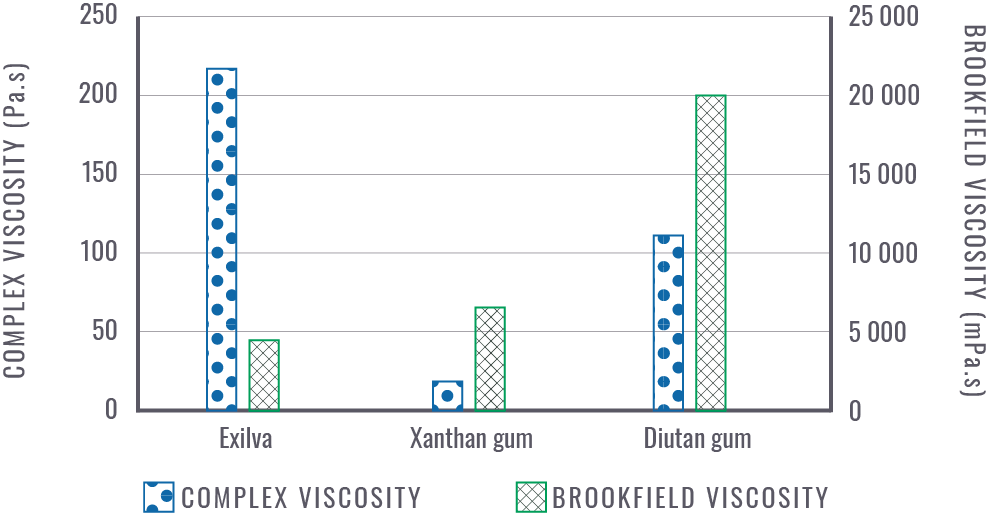
How to Improve Agricultural Formulations with a biobased rheology modifier
Martha Grøndahl | January 11, 2022
Agricultural formulations are commonly used by farmers to increase crop yields. These formulations either provide the crops with nutrients, such as liquid fertilizers (LFs), or protect the crops from diseases or pests or do both. Formulation stability is crucial to maintain a uniform and effective application.
Borregaard’s microfibrillated cellulose (MFC), Exilva®, shows great performance in this area.
The Role of cellulose fibrils in Crop Protection Formulations
Examples of crop protecting formulations were Exilva could be added are suspension concentrates (SCs), Capsule suspensions (CSs) or suspoemulsions (SEs). A variety of active and inert ingredients are used in such formulations in order to get the desired effect when applied onto the field. Stabilising the ingredients can often be challenging, so sedimentation or flocculation of the ingredients may occur. This can block application equipment such as spray nozzles, and cause non-uniform application of the mixture onto the field.
To overcome these challenges, rheology modifiers are used to improve the rheology and stability of agricultural formulations. The demand for biobased solutions is increasing due to the huge shift towards sustainable agriculture. Unmodified gums such as xanthan gum and diutan gum are commonly used in this case as they fulfill to some extent the needs as suspending agents. These gums will fail to perform when the formulations have a high content of electrolytes such as LFs, or mixtures of crop protection formulations and LFs. Unmodified gums will typically not be compatible with these formulations. Exilva® has shown to be a good alternative in such formulations and to have high salt tolerance.
The Need for Biobased Solutions in Agriculture
Exilva® is a sustainable, biobased, un-modified, biodegradable and highly compatible and tolerant rheology modifier. In high electrolyte systems, Exilva®’s extreme shear thinning behavior is maintained, ensuring low flow viscosities and high viscosities at rest. This results in formulations that are easy to pour or spray, in addition to being stable over time. In this blog post we will demonstrate that using Exilva® can be a novel alternative to gums in high electrolyte systems.
Sustainable Alternative to Gums in Agricultural Formulations
High electrolyte systems such as liquid fertilizers can be mimicked by dissolving nutrient salts in water. 1 wt.% of Exilva® fibrils, Xanthan gum and Diutan gum were dispersed separately in these salt solutions. The flow (Brookfield) and rest (complex) viscosities of the suspensions were measured 24 hours after sample preparation and the results are shown in the figure below.
Comparison of Exilva® with Xanthan and Diutan Gums in High Electrolyte Systems
Flow viscosity vs Viscosity at rest with 10% of a fertilizer salt:
Exilva, xanthan gum and diutan gum
Flow viscosities (Brookfield) and Complex viscosities (Pas) of 1 wt.% fibril content of Exilva®, Xanthan and Diutan gum suspensions with 10 wt.% salt, measured 24 hours after sample preparation.
The salt suspensions with Exilva® have the lowest Brookfield (flow) viscosities, while the salt suspensions with Xanthan and Diutan gums are more viscous and harder to pour as indicated by the higher Brookfield viscosity values. Liquid fertilizers should be easy to pour and spray, properties enabled by Exilva®.
At rest, most of the salt suspensions with Exilva® show similar or higher complex viscosities indicating a better stability compared to the Xanthan and Diutan gums. Increased viscosity at rest is important for agricultural formulations as it keeps the active ingredients suspended and well dispersed throughout the matrix, avoiding flocculation or and sedimentation.
Benefits of Using exilva in Agricultural Formulations
Exilva® is an electrolyte tolerant rheology modifier that improves anti-settling properties in suspensions and concentrates. Exilva® contributes to longer shelf-life, ease of use and fertilizer compatibility. Other benefits of Exilva® in agricultural formulations is the stability over a wide range of pH as well as increased temperatures. In addition, Exilva® is robust against microbial degradation, whereas biocides often must be added to gums to avoid microbial degradation.
If you found this topic exciting and wish to know more about the salts tested and measurement conditions or how Exilva can help your application, don't hesitate to contact one of our experts.
Written by:
Martha Grøndahl
Martha first started working with microfibrillated cellulose in 2018, through her Master's Degree in Chemical Engineering and Biotechnology from NTNU. She joined Borregaard in 2019, as a trainee, and has been a researcher focusing on Exilva and its performance in agricultural applications since 2021. Now she holds the position as Process Owner in Exilva.
